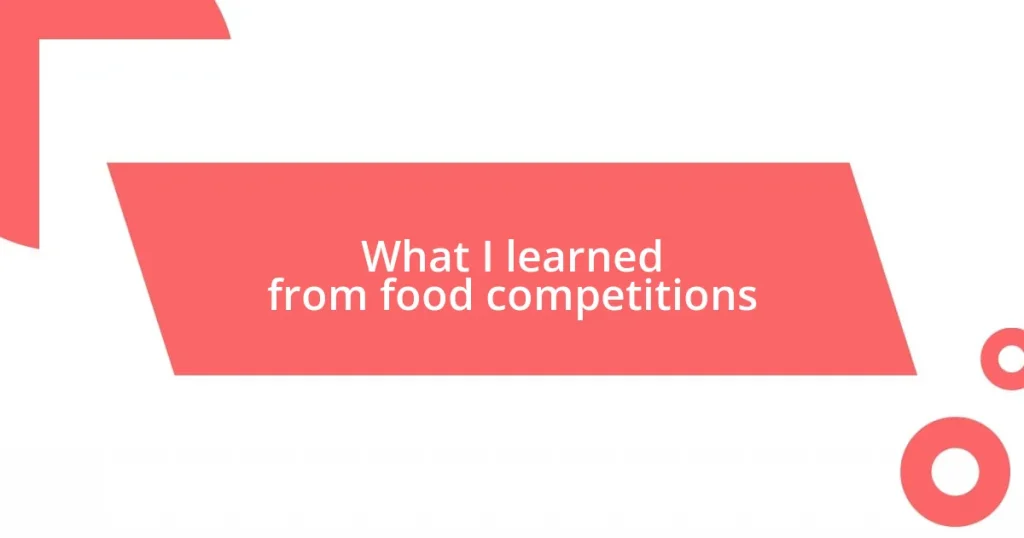Key takeaways:
- Food competitions foster culinary skills, creativity, and camaraderie among participants while creating an exciting atmosphere.
- Key benefits include skill development, networking opportunities, constructive feedback, and resilience against fear of failure.
- Success in competitions relies on effective preparation, mental visualization, seeking feedback, and maintaining composure during challenges.
- Continuous learning, reflection on experiences, and adaptability to unexpected situations enhance overall performance and growth in culinary endeavors.
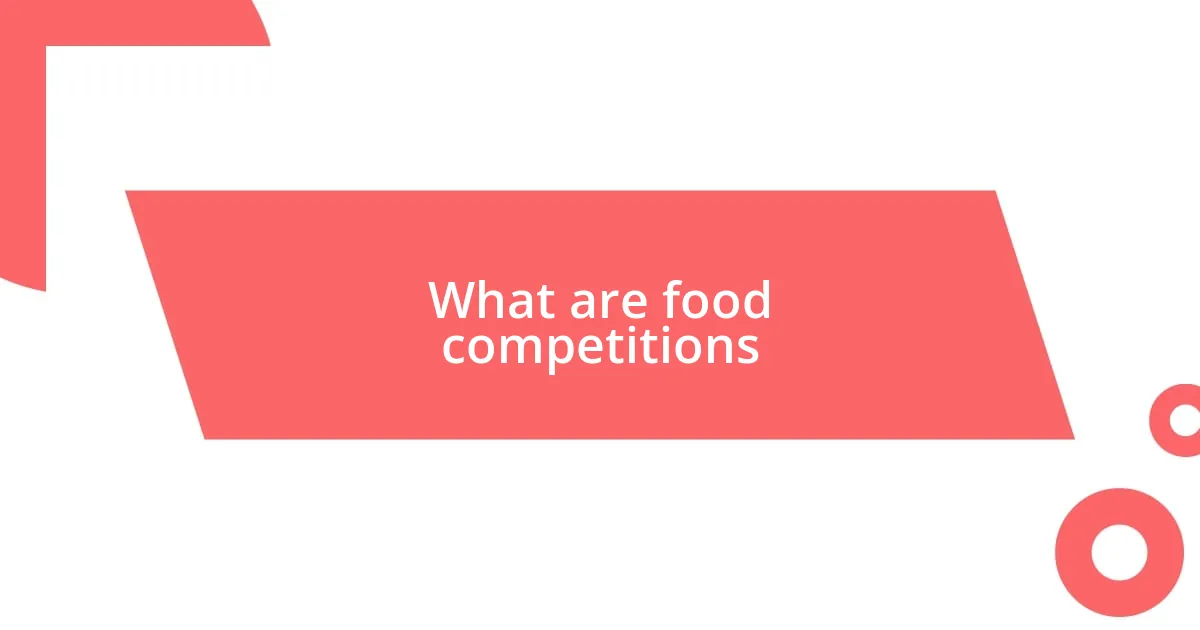
What are food competitions
Food competitions are thrilling events where culinary skills are put to the test. Chefs and home cooks alike come together, aiming to impress judges with their creativity, technique, and flavors. I remember my first taste of competition—an electric atmosphere, the scent of spices mingling in the air, and the pressure to elevate my dish above the rest. Can you imagine the adrenaline rush of cooking against the clock?
These competitions can take many forms, from televised shows like “MasterChef” to local bake-offs or chili cook-offs. Each challenge pushes participants to innovate, often forcing them out of their comfort zones. During one event, I found myself experimenting with an ingredient I’d never used before. It was a leap into the unknown and a moment of sheer excitement—discovering new flavors can be so rewarding!
At their core, food competitions are about more than just winning; they’re a celebration of passion and creativity. I’ve seen friendships form amid the chaos of the kitchen, as competitors bond over shared experiences. Doesn’t that sense of camaraderie make competing even more special? These moments illustrate how food can connect us, even in the heat of rivalry.
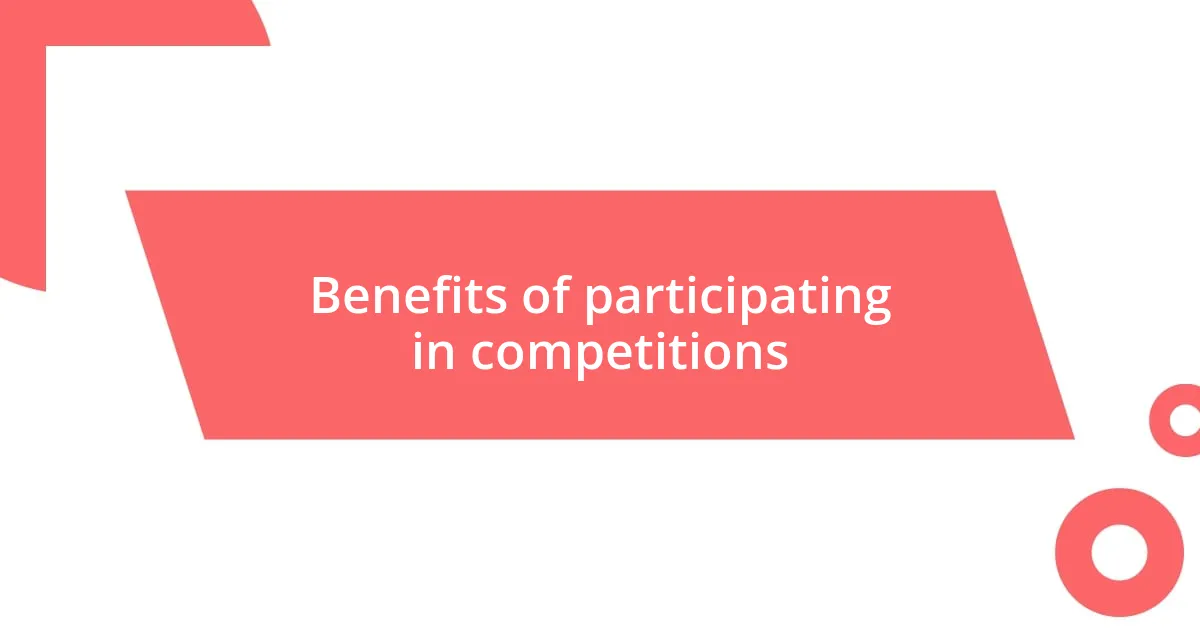
Benefits of participating in competitions
Participating in food competitions brings a rush of benefits that extend far beyond the immediate excitement of the event. For instance, I’ve often found that competition sharpens my culinary skills more than any casual cooking session could. There’s something about the pressure that makes you focus and elevate your game. In one of my early competitions, I remember struggling with time management, but by the end, I walked away with not just improved techniques, but a newfound confidence in my abilities.
Here are some key benefits I’ve observed:
- Skill Development: Competitions challenge you to refine your techniques and learn new ones on the fly.
- Creativity Boost: The need to stand out often leads to innovative dish ideas that I might not have tried otherwise.
- Networking Opportunities: I’ve made valuable connections with fellow chefs and industry experts, some of which turned into mentorships.
- Constructive Feedback: Judges provide insights that can be pivotal for personal growth, allowing me to see my cooking from a different perspective.
- Immunity to Fear: Competing has helped me overcome my fear of failure, granting me a liberating sense of resilience.
Competing also cultivates invaluable life skills. I recall one intense dessert competition where my soufflé didn’t rise as I envisioned. Instead of letting it derail me, I pivoted by adapting on the spot—an experience that taught me more about perseverance than any cooking class ever could. The lessons learned in these high-pressure moments truly extend to daily life, honing adaptability and quick problem-solving skills that serve me well long after the competition ends.
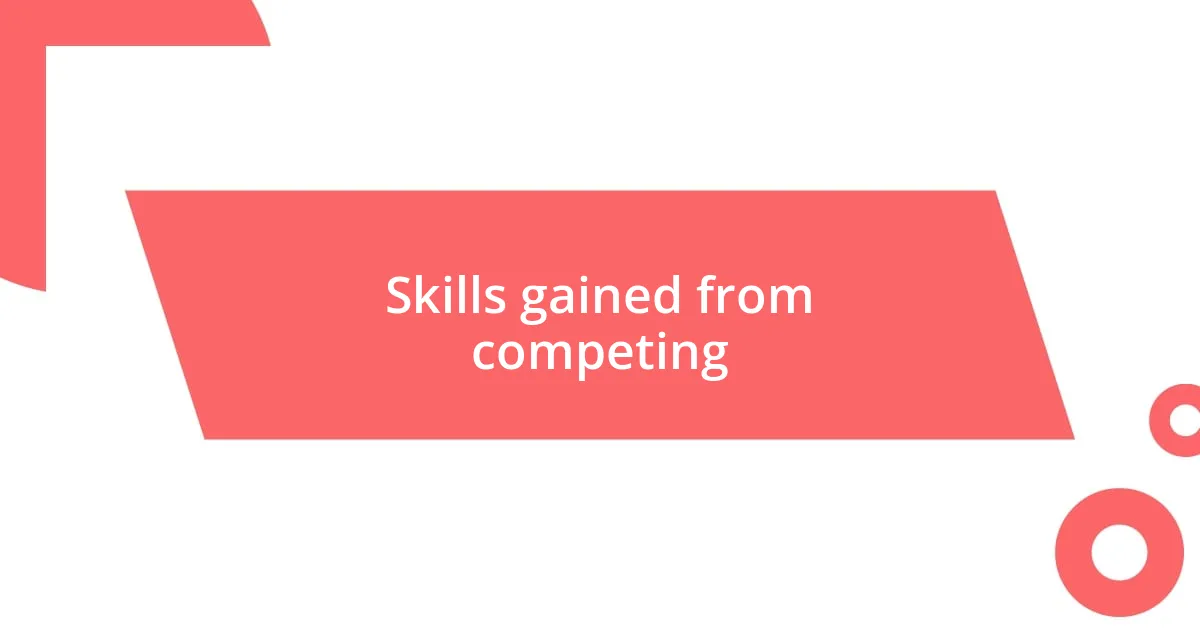
Skills gained from competing
Competing in food competitions has profoundly transformed my culinary journey, equipping me with a variety of essential skills. One particular skill that stands out is time management. In one heats of a pressure-packed competition, I found myself split between multiple tasks—all while racing against the clock. The intense atmosphere forced me to prioritize effectively, honing my ability to focus on the essentials and execute tasks efficiently. It’s amazing how tight deadlines can breed clarity in the kitchen.
Moreover, I’ve developed a real knack for creative problem-solving. I recall a nail-biting moment when my main ingredient was accidentally spilled—a complete disaster that could have knocked me off my game. Instead, I quickly shifted gears. I used whatever I had at hand and even discovered a new flavor combination that surprised not only the judges but me as well. This experience ignited a newfound confidence, showing me that setbacks can lead to unexpected triumphs.
Lastly, the competitive environment fosters resilience like nothing else. I can still remember my first loss; it stung deeply. However, the feedback provided by the judges turned that disappointment into motivation. I learned to embrace critiques as a catalyst for growth and improvement. This perspective is invaluable—not just in competitions, but in life in general.
| Skill | Description |
|---|---|
| Time Management | Ability to prioritize tasks under tight deadlines, enhancing focus and efficiency in the kitchen. |
| Creative Problem-Solving | Capacity to adapt and find innovative solutions when unexpected challenges arise. |
| Resilience | Developing a strong mentality to embrace feedback and setbacks as opportunities for growth. |
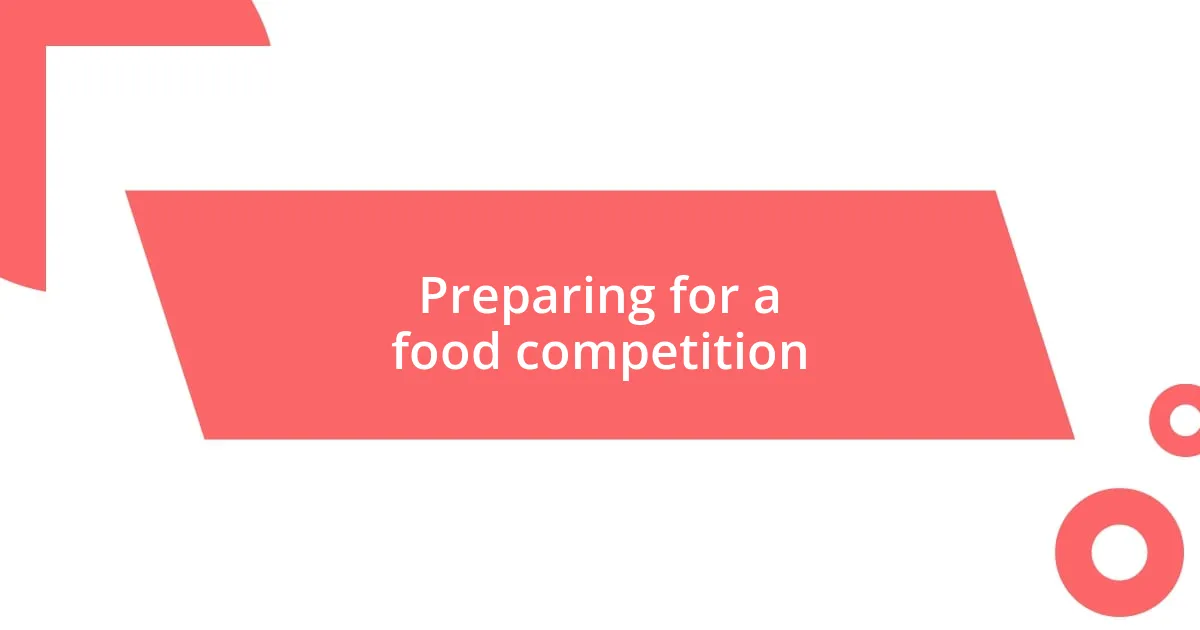
Preparing for a food competition
Preparing for a food competition is a multifaceted process that demands dedication and strategic planning. I always start by selecting a theme or cuisine that resonates with my culinary strengths and interests. For example, during one memorable competition, I chose Italian food, which allowed me to showcase my pasta-making skills. The clarity of purpose not only fueled my creativity but also boosted my confidence as I honed each dish to tell a story.
In my experience, practicing under timed conditions is essential. I can vividly recall a practice session where I set a timer while preparing a three-course meal. The adrenaline rush mimicked the competition atmosphere, helping me identify which dishes took longer than expected and where I could streamline my processes. Have you ever felt the pressure of a ticking clock while cooking? That urgency is both exhilarating and a great teacher, sharpening your focus.
Moreover, I find it critical to prepare for the unexpected. During my last competition, I packed additional ingredients just in case something didn’t go as planned. Sure enough, one of my primary components ended up being spoiled when I arrived at the venue. I quickly pivoted by improvising with what I had brought along. This taught me that flexibility is just as vital as preparation—sometimes, the best moments arise from creative adaptations. How do you handle surprises in the kitchen?
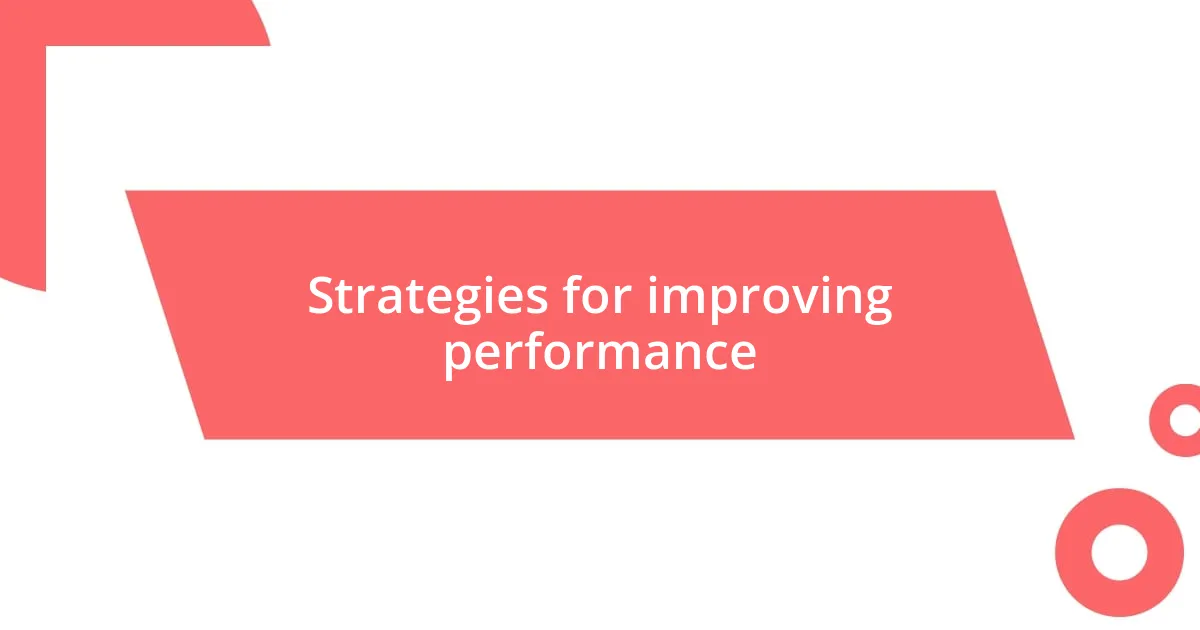
Strategies for improving performance
To improve performance in food competitions, I’ve discovered that visualization plays a pivotal role. Before each competition, I take a moment to close my eyes and envision every step of my cooking process. Picture this: I’m standing in front of the stove, ingredients prepped, and in my mind, I can see the final plate coming together perfectly. This mental rehearsal not only calms my nerves but also reinforces my strategy and boosts my confidence as I step into the kitchen.
Another strategy that has served me well is seeking feedback from peers and mentors before the actual competition. I remember one instance where I presented my trial dish to a group of fellow culinary enthusiasts. Their honest critiques revealed subtleties I hadn’t considered, like flavor balance and presentation. Engaging with others in this way fosters a collaborative spirit and pushes me to elevate my game. Have you ever had that moment when a friend’s insight completely altered your perspective on a dish? It reminds me that while cooking often seems like a solo endeavor, collaboration can be incredibly enriching.
Lastly, the importance of mental resilience cannot be overstated. I make it a habit to practice mindfulness, especially during those high-pressure moments. There was a time when I almost froze during a competition due to anxiety; however, I took a deep breath and recentered myself. By reminding myself of previous victories and what I’ve learned, I found clarity amid chaos. What techniques do you use to stay focused under pressure? I’ve found that taking a moment to reset can restore my calm and improve my performance dramatically.
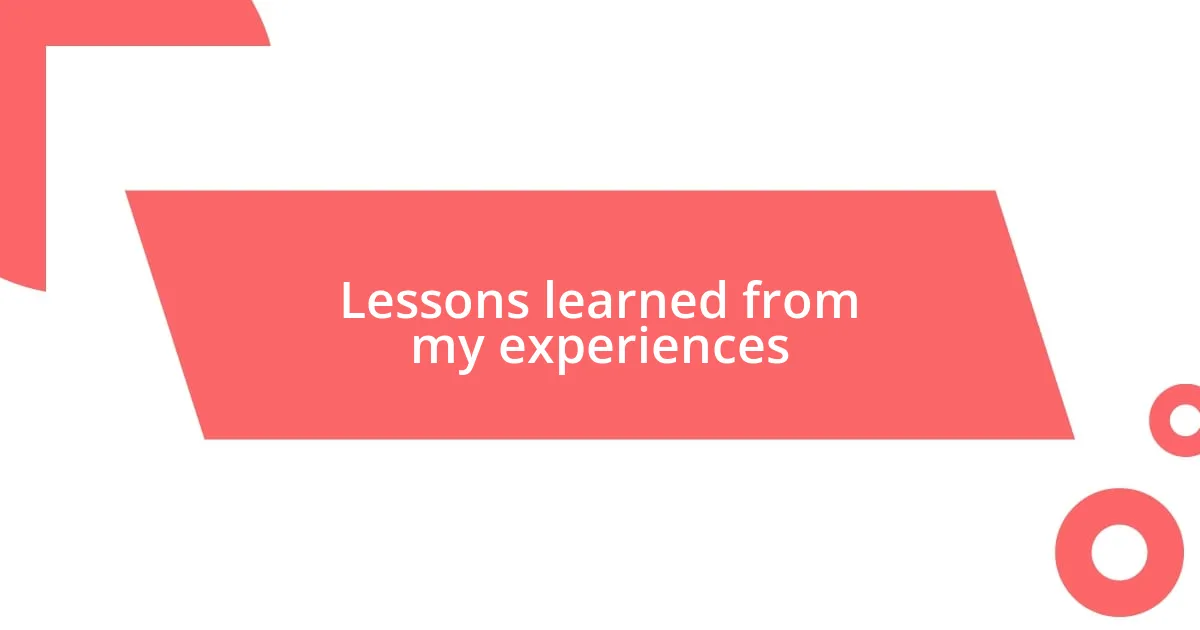
Lessons learned from my experiences
Throughout my experiences in food competitions, I’ve learned that passion truly fuels creativity. I remember the rush I felt while plating a dessert inspired by my grandmother’s recipe. The nostalgia not only deepened my connection to the dish but also made my presentation stand out because it was infused with love and personal history. Isn’t it amazing how a simple memory can elevate a dish?
One significant lesson I picked up is the value of composure during unexpected challenges. During one competition, I faced a last-minute equipment failure—my oven broke down! Instead of panicking, I utilized alternative methods, like using a stovetop or sous vide technique for some components. This experience taught me that maintaining a level head can turn a potential disaster into a creative opportunity. Do you have a mantra or technique that helps you stay calm in the heat of the moment?
Lastly, I’ve found that continuous learning is essential. After every competition, I reflect on my performance and identify specific areas for improvement. I still remember a particular contest where my knife skills were put to the test; I realized I could benefit from taking a knife skills class. This realization pushed me to pursue growth actively, reminding me that every experience is an opportunity to learn. Have you ever left a situation feeling both fulfilled and motivated to enhance your skills? Those moments are invaluable in the culinary journey.










